Two Strong Earthquakes Shake Southern Iran
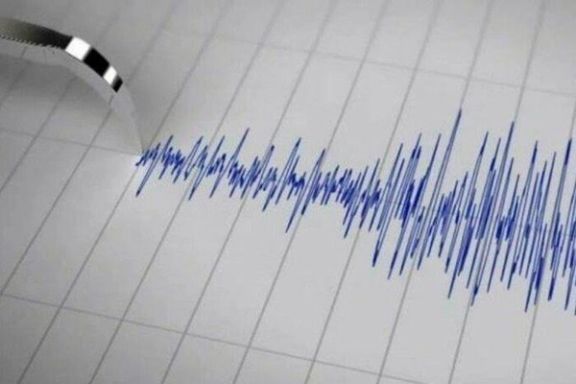
Two strong earthquakes struck southern Iran on the Persian Gulf Sunday, prompting residents to flee their homes and killing at least one person, media reported.

Two strong earthquakes struck southern Iran on the Persian Gulf Sunday, prompting residents to flee their homes and killing at least one person, media reported.
The quakes measured 6.3 and 6.4 magnitude, jolting the province of Hormozgan, state TV said, and the tremors were felt across the gulf in Dubai. The first tremor occurred at 15:36 local time, and the second one followed after one minute, Fars news website said.
The head of Iran’s Red Crescent in the region was quoted as saying that they were strong tremor with potentially devastating damage.
"The quake was felt in several southern Iranian cities in the Hormozgan province," a local official told state TV.
The European Mediterranean Seismological Centre put the magnitude of one of the quakes at 6.5 at a relatively shallow depth of 10 km (6 miles).
Mehrdad Hassanzadeh, director of Hormozgan’s emergency services said telephone and internet services have been disrupted in the region. The tremor was felt in a wide area of southern Iran.
"It was felt in northern and eastern side of the United Arab Emirates without any effect," the UAE's National Centre of Meteorology said in a tweet.
With reporting by Reuters
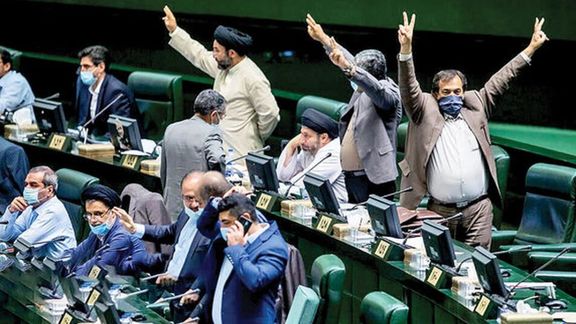
Iran's parliament on Sunday delayed a bill that would eliminate a huge government subsidy for essential goods which weighs heavily on Iran’s depleted reserves.
The bill proposed by President Ebrahim Raisi is an amendment to the current year's budget law to allow the government to stop allocating cheap dollars for importing basic commodities. These include cooking oil, animal feed, medicine and medical equipment.
The government has said that instead, it is planning to pay a direct monthly cash handout of 1.1 million rials (less than $4) to 60 million Iranians whose income level is considered low.
The subsidy started when the national currency began to lose value in early 2018, raising food prices. The cheap dollars were provided to importers at 42,000 rials, instead of the current free market rate of 280,000 rials to one US dollar.The government has spent an average of $8 billion a year since April 2018 to finance subsidized essential imports.
Before the parliament took vote on the urgency of the controversial bill Sunday morning, a member of the Planning and Budget Committee, Ehsan Arkani, claimed that the government had retracted its bill.
The parliament, however, voted to decide the urgency of the bill. Lawmakers voted against not only the bill’s double-urgency but also single-urgency. Double-urgency, if approved, meant the bill would have been debated and put to vote within 24 hours while single-urgency would have given the bill priority over other bills and motions on parliament's agenda. To kick back the bill means it might languish until April, after the start of the Iranian new year.
Eliminating the “cheap dollar’ subsidy would raise prices of essential goods by five to six times but would also help make up for some of the huge budget deficiency the government is grappling with and somewhat slow down inflation.
The main reason for the government's insistence on doing away with the scheme is remedying the budget deficit, conservative Alef website argued. "All other reasons offered by administrations [in the past and now] are secondary."
Alef also argued that although reforming the exchange rate for importing basic commodities is defendable, those who oppose it now are worried about when and how such a reform should be carried out to prevent undesirable consequences such as cash flow problems for importers.
Higher prices can also push down consumption of protein and dairy products, the article said, and affect production, employment, and even people's health. Payment of cash handouts, also, could backfire and push up the annual inflation rate which now stands at around 45%.
Putting the budget law amendment bill on the back burner means the government will have to resort to other measures, such as borrowing from the Central Bank, to remedy the current year's budget deficit. The Central Bank in turn has no reserves and has to print money, fueling inflation.
Meanwhile, the national currency has continued to plunge against the dollar as the country awaits the resumption of nuclear talks with world powers in Vienna on November 29. The rial fell to the lowest point in the past twelve months Saturday by crossing the 285,000 mark against the US dollar.
The official news agency IRNA's tweet 11 November about unfreezing of $3.5 billion of Iran's funds blocked in other countries has done very little to reassure the market and stop the further depreciation of the rial. An officials of the Iran-Iraq trade chambers said Sunday that Iraq has not released any funds. The head of Iran-South Korea chamber also said Saturday that South Korea has not released any of the Iranian funds frozen in that country.
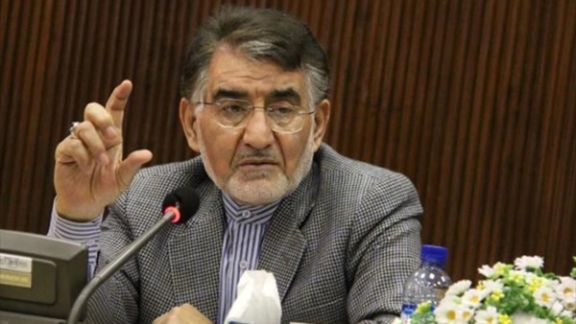
The chairmen of Iraq and Korea joint chambers of commerce say news about $3.5 billion of Iran’s frozen funds being freed is not related to the two countries.
Yahya Ale-Es’haq chairman of Iran-Iraq joint commerce of chamber and Hossein Tanhaee, head of the Korean chamber were responding to claims by Ali Naderi, the CEO of the government’s official news agency IRNA on Friday, that recently $3.5 billion of Iran’s frozen funds abroad were released.
This claim was followed on Saturday by Javan newspaper, affiliated with the Revolutionary Guard, that claimed $4 billion has been released “without negotiations”, but providing no details.
Ale-Es’haq told local media that Iraq has not freed any of the funds it owes Iran due to US banking sanctions and if the news about frozen money being released is true, it could be related to South Korea. Two banks in Seoul hold $7 billion also frozen because of US sanctions.
But Tanhaee separately told ILNA news agency late Saturday that South Korea also has not released any funds.
Last week, South Korea’s Yonhap news agency wrote after Korea's first vice minister for foreign affairs, Choi Jong-kun, talked by phone with the US special envoy for Iran, Robert Malley, that Seoul and Washington maintained communication over Iran, especially on Iranian assets locked in South Korean banks.
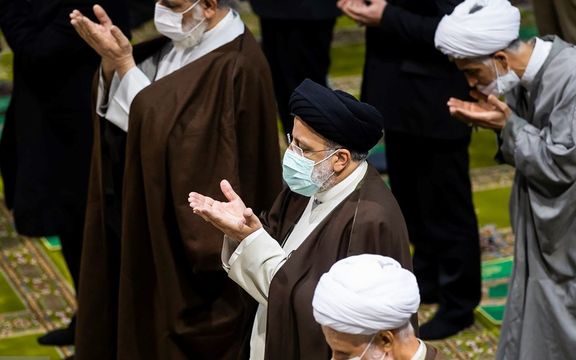
In a recent meeting with economists, President Ebrahim Raisi asked basic questions about the sorrow state of Iran's economy, showing a lack of prior planning.
In a meeting with economists in November 9, Raisi had asked "why the economy is not doing well, why Iran has not been able to have a single-digit inflation rate, why the people cannot see the impact of tens of billions of dollars of government subsidies in their daily life, and why Iran's economic growth rate has been less than one percent during the past eight years despite high government spending?
The fact that the president of the country asked these basic questions after 100 days in office, shows a lack of preparation and planning by his government, a point highlighted by many domestic critics.
According to Donyaye Eqtesad (Economic World), a newspaper that generally supported the policies of Iran's previous administration, economists told Raisi conditions are not favorable for businesses in Iran. A decline in domestic and foreign investment, as well as the impact of sanctions have suppressed the country's economic growth.
The long process to get government permits to do business, lack of a good legal framework, and unfair taxation are the main elements leading to unfavorable conditions. Iran's global ranking in terms of ease of running a business is 128, while anything above the rank of 50 is considered unfavorable, the newspaper said.
The daily said that in three major indicators Iran faces serious problems: Economic growth, the rate of inflation and the unemployment rate.
Meanwhile, because of overall unfavorable conditions and the lack of a promising outlook for the future of the economy, there has been a sharp drop in domestic and foreign investment in Iran. Furthermore, this disrupts the trend of economic growth in the long run. With the current trend, economists cannot expect anything more than a 4 percent growth in the best-case scenario, economists told Raisi.
Besides, international sanctions have created a major challenge for the economy. Likening the Iranian economy to a bus, the economists said that the bus is no longer able to run on the main road and has veered off to a rough side road, which has made progress virtually impossible. At the same time, sanctions are one of the major reasons for the drop in investment. More problems are created by the Iranian government's interventionism including the manipulation of prices. All these have led to a drop in employment.
Answering the question of why the government has not been able to bring about economic growth, the economists answered that it is not the government's job to create economic growth. The government only needs to improve the businesses environment to facilitate growth. Meanwhile, lack of expertise among government officials has resulted in wasting a lot of resources that they thought would bring about growth.
On the question of high inflation close to 50 percent, the economists blamed a large budget deficit and constant government borrowing from the central bank. This has led to an unusual growth in liquidity which inevitably gives way to high inflation.
The economists' answer to the question of why hefty government subsidies have not helped ordinary people, was that the hidden subsidies, such as the world’s second cheapest gasoline, help those who consume more, not those who need help. At the same time by depleting government coffers, hidden subsidies lead to structural inflation, which also hurts working class people.
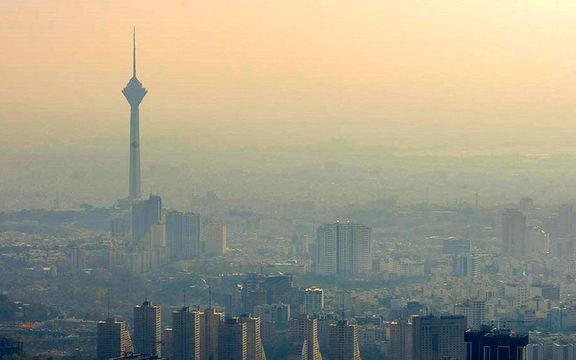
After a winter weather front passed from central Iran on Friday, the Iranian meteorological agency announced a “yellow” pollution alert for five major cities.
Citizens have been warned not the engage in heavy physical activities outdoors in Tehran, Esfahan Mashhad, Karaj and Arak. Vulnerable people have been told to stay indoors.
It is not yet clear if burning of dirty, heavy fuels for electricity generation has led to the heavy pollution, but Iranian officials had warned months ago that with shortages of natural gas, they would resort to using diesel fuels in winter months.
Consumption of gas and electricity increases during cold winter and hot summer days.
Last winter, Iran burned mazut, a type of dirty diesel that polluted many large cities, which led to protests. Tehran and Esfahan were listed in category red during last December-January.
The same energy crisis happened again in June when air-conditioners kicked in raising electricity consumption. Iran has one of the cheapest electricity rates in the world.
Iranian officials said earlier this year that up to 40,000 people die prematurely every year because of air pollution.
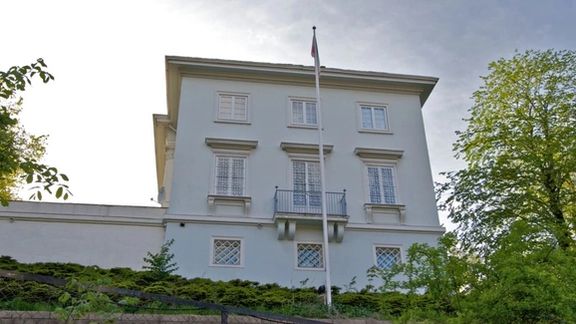
Norwegian police have charged a former Iranian diplomat for his alleged role in the 1993 assassination attempt on the publisher of Salman Rushdie’s Satanic Verses.
The Norwegian state broadcaster NRK reported Friday that a senior former Iranian envoy and a Lebanese man were charged over the attempt to kill Nygaard in Oslo.
William Nygaard published the Satanic Verses, a bestseller written by British-Indian novelist Salman Rushdie, who was condemned to death in a fatwa of then-Supreme Leader Ruhollah Khomeini of Iran over his portrayal of the Prophet Muhammad.
Nygaar survived three bullets but spent months in hospital. The police at the time suspected personal motives in the attempted murder according to the New York Times, and for years there was no movement in the case although there was speculation that the attack was politically or religiously motivated. Some sources said the Iranian embassy was always on the police radar.
In October 2018, the Norwegian police announced their intention to file charges against two suspects, but no names or clues were provided.
Iranian journalist Kambiz Ghafouri, who lives abroad, tweeted Saturday that the former diplomat is Mohammad Nik-Khah, who was first secretary of the Iranian embassy in Norway in 1993. Nik-Khah is most probably in Iran. The Iranian embassy at the time announced that the first secretary, who had been in Norway since 1989, had left the country a few days before the attack on Nygaard.
The case now will remain open for another 30 years.
The Norwegian publisher was not the only one targeted over the Satanic Verses, which provoked widespread anger in the Islamic World. In February 1989, six protestors were killed in an attack on the American Cultural Center in Islamabad, Pakistan.
Ettore Capriolo, the Italian publisher of the book, survived a stabbing, but Hitoshi Igarashi, the Japanese translator, was stabbed to death in July 1991.
Iran has been implicated in many assassinations, kidnappings and terror attacks abroad against dissidents and opponents. Several senior Iranian officials have been indicted over various attacks, most controversially over the 1994 bombing of a Jewish community center in Argentina.
In recent years, Assadollah Assadi, an Iranian diplomat based in Austria, was sentenced to 20-years jail in Belgium in February for involvement in plot to bomb a rally in France of the opposition Mujahedin Khalq Organization in France. Assadi had been arrested by German police.